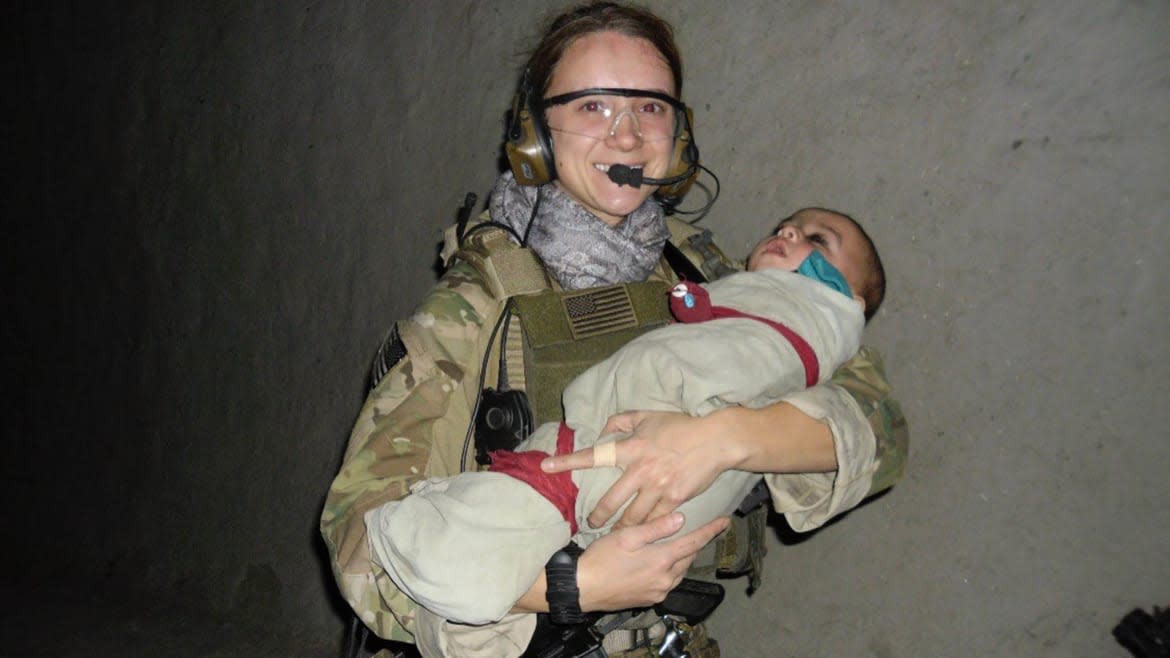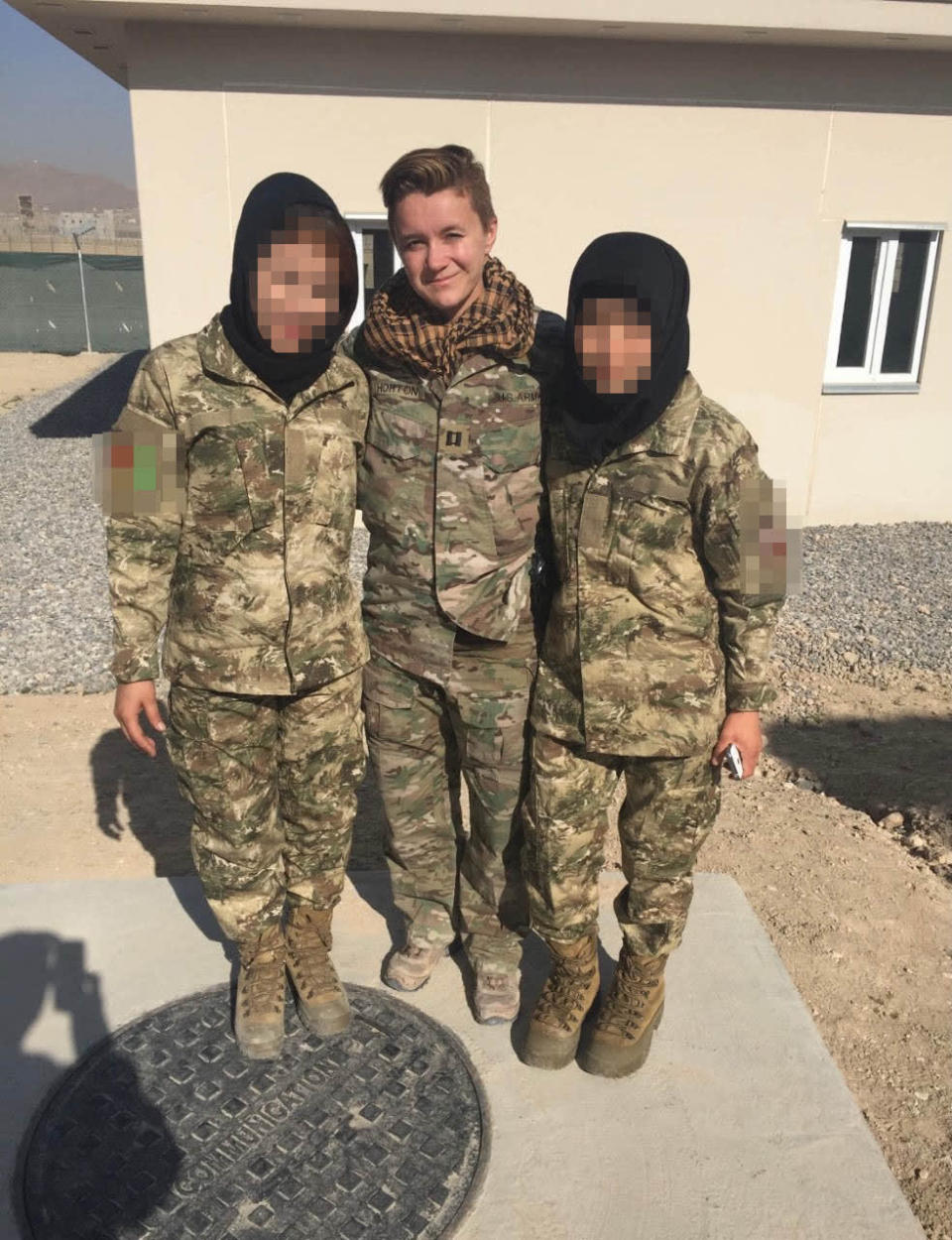How America’s G.I. Janes Trained Afghan Women to Fight the Taliban

Back in 2011, two years before American women were authorized to engage in combat, the U.S. military fashioned a loophole called the Cultural Support Team (CST).
Women from the Army, the Navy, the Marines, and the Air Force took special forces training and went into action in Afghanistan alongside their male counterparts. The idea was the CST could deal directly with Afghan civilian women the teams encountered without violating cultural prohibitions.
And just as male special forces operators train male Afghan soldiers, the CST did the same with female Afghan enlistees. Those female Afghan warriors are now trapped in a country where women who do not remain subservient at home in a burqa are subject to violence. And CST veterans such as former Army Capt. Alex Horton know how the Taliban is liable to treat women special forces operators who were trained by Americans.
“My hope is that they get out,” Horton said of the Afghan women the CST began training in 2012. “My hope is that they are taken care of as they deserve. And their families.”
Horton then said, “And if not, my hope is they fight back.”
She has no doubt about their abilities.
“If I’m honest, better than some of the men I’ve worked alongside,” she said. “They could fast rope. They could shoot better.”

Former Army Capt. Alex Horton says she hopes women soliders in Afghanistan either get out or use their training to fight back.
Horton allowed that she initially harbored doubts about the training endeavor. At the time, she and her fellow American women in CST were only just managing to establish themselves going “out on the bird,” as going on a mission is sometimes called in the special operations realm.
“We had just made it in the door,” Horton said. “We had just gained a small morsel of respect and now not only were we fighting for us to get out on the bird, but also vouching for them.”
But then she witnessed an even more dramatic transformation among the Afghans than the American women had experienced.
”To feel and be wanted and needed and respected and to never have had that before I think is what gave them the level of determination and grit and fire,” she said. “I loved being part of it.”
Under the tutelage of the Americans, the Afghan women would be on the edge of their seats, ready to learn and master whatever was next.
“It was a beautiful thing to see,” Horton said.
As more Afghan women arrived at the training base, some of those who had been through training assumed leadership roles and took the newcomers under their wing.
“Just like being mother hens to them,” Horton said.
Horton became the program manager of CST and was deployed to Afghanistan six times. She recalls that between deployments, she went by a yoga studio and then arrived back in the war zone with donated yoga pants and sports bras for her Afghan trainees.
“They were walking around in the Lululemon sports bras, just so proud,” Horton recalled.
She would remember the sight as an instance of what people too often overlook when they ponder the war.
“The humanity,” Horton said.
When GI Jane Joined Special Ops
Another moment of humanity came during a pause on a mission, when Horton’s team was invited into an Afghan family’s home. Horton was allowed to hold their baby.
“I was so happy they saw me as a friend, not an enemy,” Horton recalled.
As the forever war went on and on and on and on, Horton and the American women formed forever bonds with their Afghan counterparts.
“I had women working with them every single day, year after year after year, who loved them like they were sisters, who trained them and developed them and made sure when they would go on a mission that they were prepared,” Horton said.
Horton left the Army last year, having started at 19 in ROTC, now with a decade of special operations experience. But she continued to feel the loss of two CST comrades: Lt. Ashley White, who arrived in Afghanistan ahead of Horton and was killed by an IED on Oct. 22, 2011; and Capt. Jennifer Moreno, who was killed along with two Army Rangers and an Army investigator by a suicide bomber accompanied by IEDs on Oct. 6, 2013.
Horton also did not forget the the CST-trained Afghan women who were fighting on after she had left.
All that has made the events in Afghanistan these past few days even harder for the 33-year-old combat vet to witness.
“I think everyone right now is feeling it,” Horton said.
On Monday night, Horton said, she took out a journal she kept during her first deployment in 2012. The first entry began with a question.
“What are we doing here?”
There is still no answer.
“I think the reality is that what we saw, what was occurring on the ground, is never what was reported,” Horton said. “It was all smoke and mirrors and a lot of positive Powerpoints, and as you went up into the echelons and across the pond back to D.C., that got whitewashed more and more.”
Desperate Afghan ‘Helpers’ Cling to Planes as U.S. Abandons Them at Kabul’s Airport
The images this week from Kabul Airport may be much like those from the fall of Saigon, but Horton cautions against taking comparison too far. Those who served in Afghanistan have been treated much better upon their return than those who came back from Vietnam. But where the Vietnam conflict was the big issue back home, much of the country seemed to all but forget there was a war in Afghanistan.
Now Horton fears those most at risk with the triumph of the Taliban—the women of Afghanistan—will also be forgotten.
“I think if you look at the history of the world, the common theme is that women are consistently overlooked, women are an afterthought,” Horton said. “I grew up with a very strong and fiery mother who instilled in me at a very young age that I could be whatever I wanted to be.”
Horton added, “I also have been provided with the privilege of being born within the U.S, which has allowed me to advocate on behalf of women’s rights not only in the U.S., but abroad.”
That included Horton’s time in CST, when she imparted a version of her mother’s can-do attitude to the Afghan women.
“That part of the mission makes sense,” Horton said.
Horton has not been in contact with the Afghan women warriors since she left the military, but those still in CST have been and are doing all they can to get their forever sisters out safely.
And, as Horton notes, if the Afghan women cannot get out, they are least trained to fight.
Got a tip? Send it to The Daily Beast here
Get our top stories in your inbox every day. Sign up now!
Daily Beast Membership: Beast Inside goes deeper on the stories that matter to you. Learn more.

